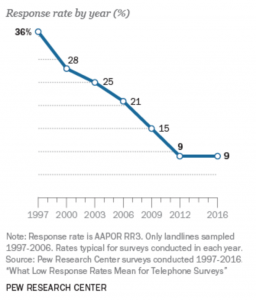Is Public Opinion Truly the Opinion of the Public?
The Trump administration has released its plan regarding immigration in the United States, eliminating the Visa Lottery System, providing a pathway to citizenship for those registered in the DACA program, and requesting $25 billion to go towards building a border wall with Mexico. As support for these measures, the Trump administration cited a recent Harvard-Harris poll that indicated that 80% of Americans were in favor of closing the borders with Mexico. However, in a recent article NPR has called into question the accuracy of these results and has highlighted the inherent qualities of polls and surveys that may result in inaccurate conclusions. The biggest contention with this specific poll was in the way the questions were worded, suggesting that the questions may have been leading in some way or phrased such that participants were unknowingly persuaded into choosing the perceived socially acceptable or morally righteous choice.
What the NPR article did not address was that Harvard-Harris used an online survey to poll participants, something that is often a much larger issue facing surveys and polls than the nature of the questions themselves. The use of the Internet as tool for polling has become the most popular choice because it is inexpensive and allows researchers to economically reach a broad audience. However, this particular approach suffers from an inability to reach those respondents without access to a computer or high speed Internet, which unfortunately consists primarily of lower income and less educated individuals. Conditions are only worsened as people find new ways of circumventing the polling system as they gain agency regarding how and when they can be contacted (Pew Research Center). This, in addition to declining response rates from telephone polling and surveys in general, is increasing the challenges of accurately identifying public opinion on important issues, which government officials rely upon in order to effectively conduct public policy.
The results of these failures and inaccuracies in polling today are adversely affecting the way our government enacts policy. The explosion of social media platforms and usage has not, ironically, resulted in a greater level of accurate communication of public opinion. With increasing levels of political polarization and general distrust of government, it is imperative that these challenges are overcome.
Sources
https://www.npr.org/2018/01/23/580037717/what-the-latest-immigration-polls-do-and-dont-say
http://www.pewresearch.org/methodology/u-s-survey-research/collecting-survey-data/
Graph: http://www.pewresearch.org/2017/05/15/what-low-response-rates-mean-for-telephone-surveys/
SaveSave
